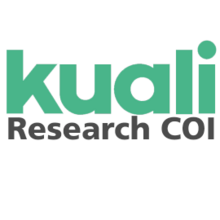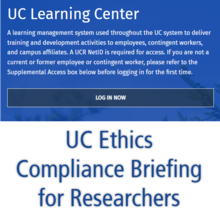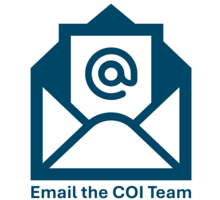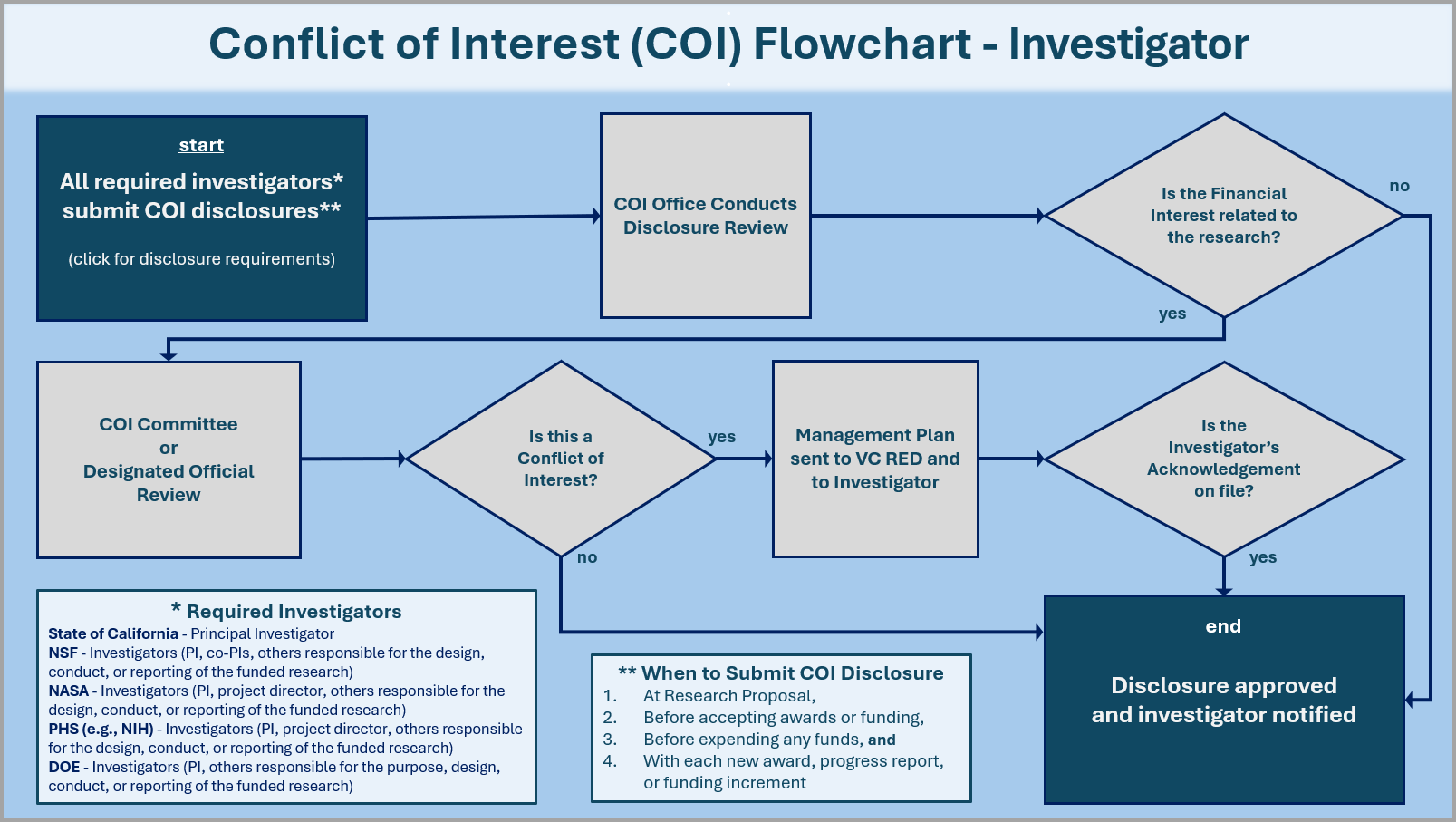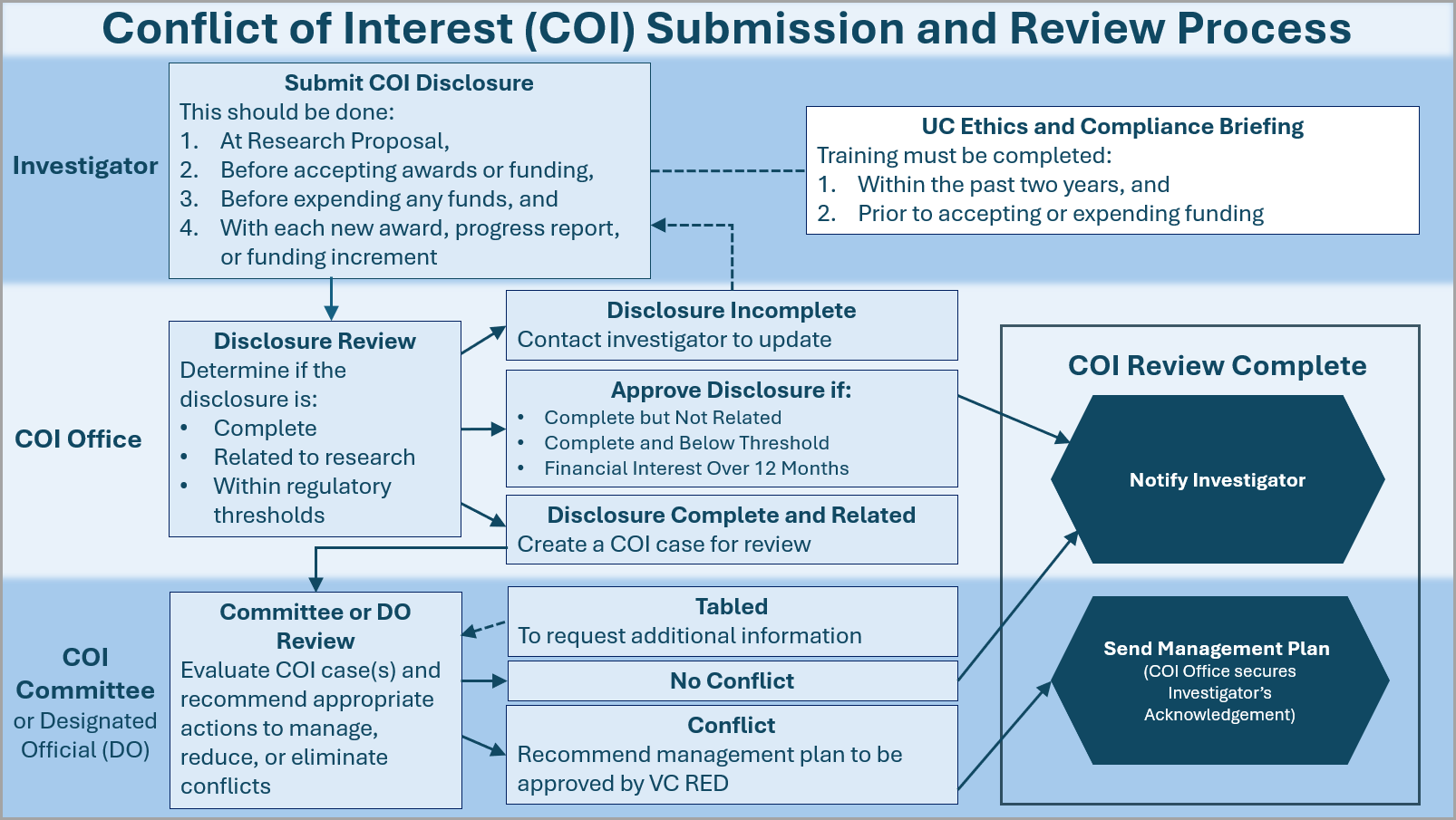
About COI
At UC Riverside (UCR), the Office of Research Compliance (ORC) supports the Conflict of Interest (COI) Committee, which advises the Vice Chancellor for Research and Economic Development (VC-RED). Together, they ensure that research conducted at UCR is designed, conducted, and reported objectively—free from bias and aligned with the highest ethical standards.
The ORC acts as a central liaison among faculty, staff, sponsors, and administrative offices to facilitate the disclosure, review, and management of real or perceived conflicts of interest in research.
As part of the University of California system, UCR adheres to system wide policies addressing financial conflicts of interest, including compliance with State of California and Federal regulations. These policies promote research integrity while supporting the University’s mission to transform lives through discovery, communication, translation, application, and preservation of knowledge.
|
|
|
What is a Conflict of Interest?
A COI is when an Outside Interest is related to an investigator’s institutional responsibilities and could or may appear to affect the design directly and significantly, conduct, or reporting of research.
Outside financial interests should be reported in Kuali per the research sponsors regulation. Outside financial interests are any financial interests and other personal interests or relationships with an external entity that are related to an investigator’s institutional responsibilities. These financial interests include but are not limited to income, travel, equity, intellectual property rights. Positions constitute an outside financial interest whether paid or unpaid. Financial interests and positions of immediate family members are included in outside financial interests.
When investigators share their financial interests per the research sponsors regulation, this assists in promoting transparency and accountability, financial disclosures also protect the researcher’s interests by 1) meeting the requirements set by sponsors and the University, 2) having the COI committee, an objective third party, review the financial interests and the research, and 3) demonstrating a commitment to scientific integrity.
How to Disclose Outside Financial Interests
All investigators must submit their financial disclosures to Kuali COI. Kuali is an interactive online form that requests financial interest information based on the research sponsor’s regulations including State, Public Health Service (PHS), Department of Energy (DOE), National Science Foundation (NSF), and National Aeronautics and Space Administration (NASA). You can find the following forms in Kuali COI.
What is the COI Review Process?
ORC staff are the initial reviewers of disclosure forms submitted to Kuali COI. Should the staff find that an investigator’s financial interest is related to their research, they then route the disclosure forms to the COI Committee. The COI committee reviews the financial interest in conjunction to the investigator’s research at their monthly meeting. If the COI committee determines that the financial interest is a conflict of interest meaning the financial interest could directly and significantly affect the design, conduct, reporting, or purpose of the research, the committee then recommends an adequate management and monitoring plan to be approved by the Vice Chancellor for Research and Economic Development (VC-RED).
Regulatory Requirements
There are currently five regulatory requirements that the University currently reviews and reports. This section includes an overview of the reporting triggers, list of investigators responsible for disclosing financial interests, when investigators should disclose their financial interests, and if training is required.
-
UC Riverside Conflict of Interest Disclosure Chart
Investigators must disclose their financial interests received within the 12 months prior to disclosure submission including the financial interests of their immediate family member. All disclosures must be approved prior to acceptance of the award or additional funding, and/or to expenditure of funds.
STATE LAW
NATIONAL SCIENCE FOUNDATION and NATIONAL AERONAUTICS & SPACE ADMINISTRATION
PUBLIC HEALTH SERVICE and DEPARTMENT OF ENERGY
Reporting Triggers
- Research contract/grant from a non‐governmental entity as the prime and/or direct sponsor.
- Research Gifts earmarked for a specific individual or specific research project.
- Material Transfer Agreement
- NSF research contracts and grants
- NASA research contract and cooperative agreements
- Non‐governmental entity which flows down NSF/NASA funds (including SBIR/STTR subawards)
- California Institute for Regenerative Medicine (CIRM) Grant, Juvenile Diabetes Research Foundation (JDRF) Grant
- UC Special Research Programs (HIV/AIDS, breast cancer and tobacco related disease)
- PHS grant, cooperative agreement, contract, or DOE financial assistance award (e.g., grant, cooperative agreement, or technology investment agreement)
- Non‐governmental entity which flows down PHS/DOE funds
- Research Funding from organizations that follow PHS/DOE disclosure requirements (i.e., American Cancer Society, American Heart Association). Complete list here.
Exclusions
- All exempt sponsors: FPPC exempt list
- All non-profit, tax-exempt educational institutions. However, researchers must disclose for the prime sponsor if the educational institution received funding from a non-governmental entity.
N/A
- SBIR Phase I or STTR Phase I award
- Office of Indian Energy
Who
- All persons employed by UC who have principal responsibility for a research project if the project is to be funded or supported, in whole or in part, by a contract or grant (or other funds earmarked by the donor for a specific researcher) from a non-governmental entity.
- All persons employed by UC who have principal responsibility for a research project if the project is to be funded or supported, in whole or in part, by a gift (earmarked by the donor for a specific researcher) from a non-governmental entity.
All investigators responsible for the “design, conduct or reporting” of the NSF-funded research project or educational activities to disclose their significant financial interests related to the research project or educational activities. Investigators must also disclose the financial interests of their spouses/registered domestic partners and dependent children. UCR’s policy is consistent with the “Investigator Financial Disclosure Policy” of the NSF.
All individuals "with responsibility for the design, conduct, reporting, or purpose1 of the research" must disclose the “significant” and “related” financial or management interests to the research described in the proposal for themselves, their spouses/registered domestic partners, and their dependent children.
What to Disclose
A financial interest in the non‐governmental sponsor of the research including:
- Income ≥ $500
- Investments ≥ $2,000
- Director, Officer, Employee, Partner, Trustee, Consultant or Management position
- Loan Balances ≥$500
- Personal Gifts Valued at ≥ $50
- Travel Reimbursements
- With the initial award
- With renewal award (additional funding intended to extend or results in the extension of a project beyond the originally approved project period)
A significant financial interest related to the research project including:
- Salary, honoraria, royalties, venture or other capital financing, or other payments > $10,000 (excluding income from seminars, lectures, teaching engagements, or service on advisory committees or review panels for public or nonprofit entities)
- Equity interest2 > $10,000 or 5% ownership interest
- Intellectual Property interest in a patent, patent application, or copyright of a software (excluding intellectual property owned by the UC.)
- With the initial proposal
- When a new Investigator(s) is added
- With any change in an investigator’s financial interest
A significant financial interest related to the Investigator’s institutional responsibilities including:
- If publicly traded entity, total value of compensation and equity interest2 > $5,000
- If non‐publicly traded entity, total value of compensation > $5,000 or any equity interest2
- Income received related to intellectual property > $5,000 (excluding intellectual property owned by the UC.)
- Any reimbursed or sponsored travel (excluding (1) travel that is reimbursed or sponsored by a US Federal, state, local government agency, a domestic Institution of higher education, or a research institute affiliated with an Institution of higher education within US (for PHS only- also exclude an academic teaching hospital, a medical center); and (2) sponsored or reimbursed travel for the Investigator’s spouse/registered domestic partner and/or dependent children.
- With the initial and renewal proposals
- With supplemental funding proposal
- With non‐competing continuation
- With no cost time extension
- When a new Investigator(s) is added
- At least annually for duration of project
- With any new significant financial interest (New significant financial interests must be reported within 30 days of acquiring or discovering the new SFI.)
Forms
- All investigators must submit their financial disclosures to Kuali COI. Kuali is an interactive online form that requests financial interest information based on the research sponsor’s regulations including State, Public Health Service (PHS), Department of Energy (DOE), National Science Foundation (NSF), and National Aeronautics and Space Administration (NASA).
- You can find the forms in Kuali COI.
Training
There is no required COI training for investigators.
There is no required COI training for investigators.
All UCR Investigators applying for and/or receiving PHS/ DOE funding must complete "General Compliance Briefing: University of California Ethical Values and Conduct" in the LMS.
Footnotes: [1] DOE only. [2] “Equity interest” includes stock, stock options, private equity, and other ownership interests. (Updated: May 2024)
Contact Us
If you have questions, the Office of Research Compliance recommends you consult and engage our office as soon as possible.
Please email us at coi@ucr.edu to set up an appointment.
- How are Research-Related COIs and Conflict of Commitment (COC) related?
-
What are some examples of mitigation or management plans to address COIs?
Some examples of how to manage, eliminate, or reduce potential research related conflicts of interest:
- Public disclosure of significant financial interests.
- Training on research-related conflicts of interest for all personnel involved in the research.
- Monitoring of research by independent reviewers.
- Double-blind study and/or randomized study
- Modification of the research plan to ensure objectivity.
- Have non-conflicted investigators collect data and perform data analyses.
- Remove oneself as the Principal Investigator.
- Disqualification from participation in all or a portion of the research.
- Divestiture of significant financial interests.
- Severance of relationships that create actual or potential conflicts.
-
I have a positive disclosure related to my research project that will be sent to COI for review. When will I receive the results of the review, so my study funds may be released?
Depending on the nature of the disclosure the review may take four to six weeks to be reviewed by the ORC and COI Committee. ORC staff will contact you if additional review is required.
-
When not reporting COIs, what are some of the potential risks?
If you have any concerns regarding COI issues, we strongly encourage you to contact our office immediately. There are significant risks involved for not reporting:
- Compromise of scientific integrity (objectivity of the research);
- Misuse of University facilities;
- Improper direction of student’s or University employee’s work;
- Unbalanced allocation of faculty member’s time and effort;
- Failure to recognize the University’s right to intellectual property and related financial interests;
- Improper channeling of research funds;
- Inappropriate delay or restriction on publications;
- Appearance of impropriety
Founding or Advising to a Company
-
What are some general principles to keep in mind when starting a company?
- Having a non-conflicted investigator and blinding the study will help mitigate the conflict; however, COI will still need to review all the factors to determine if the mentioned management is necessary and/or sufficient.
- Keep your company activities separate and distinct from UC research and administrative activities.
- Expect your company to be treated exactly like any other company.
- File a disclosure to evaluate potential conflicts and mitigate risk, if necessary.
- Not all research-related conflicts are impermissible, and most are manageable.
- When human subjects are involved, there will be a higher level of examination.
- Case-by-case analysis and management is crucial.
- When in doubt, disclose to COI.
-
Can I start a company?
UCR's research-related conflict of interest and conflict of commitment policies do not prohibit investigators from starting their own company, however there may be conflict of interest disclosure requirements and approvals required. Please contact COI for more information. For additional information on start-ups and entrepreneurial activities at UCR, visit the Entrepreneurial Proof of Concept and Innovation Center (EPIC) website.
-
Can I serve on a board of directors?
UCR's research-related conflict of interest policy does not prohibit investigators from serving on a Board of Directors, Advisors, or similar. If this position also involves other financial interests such as income or equity interests, the investigator may have additional COI disclosure requirements. Should the COI Committee determine that these interests could potentially be a conflict of interest in conjunction with the research, the Committee will require the investigator to take steps to manage, reduce, or eliminate the conflict before the research can proceed. Investigators who are contemplating serving on a board should contact COI as soon as possible to discuss conflict of interest issues related to their research.
Service on a Board of Directors carries with it legal fiduciary responsibility, but not management responsibility therefore, this position is permissible. The investigator’s primary commitment is to the University and service on a Board of Directors should not interfere with his/her primary obligations as a faculty member or university employee. For more information on COC, see the Conflict of Commitment and Outside Professional Activities website.
-
Can I serve on a scientific advisory board?
Serving on a Scientific Advisory Board is permitted because such positions do not carry, nor are they perceived to carry, management responsibility. The investigator, however, should recuse himself/herself from any discussion or decision to fund his/her own research. If this position also involves other financial interests such as income or equity interests, the investigator may have additional COI disclosure requirements.
-
I serve as consultant to a company and want to test a product from that company. What are ways to mitigate the conflict?
- Having a non-conflicted investigator and blinding the study will help mitigate the conflict; however, COI will still need to review all the factors to determine if the mentioned management is necessary and/or sufficient.
- Some factors that the COI will review includes but is not limited to:
- Understanding who has supervisory authority of all research personnel involved in the study.
- Determining if there are any research personnel under the supervision of the conflicted individual.
- Knowing if there is a non-conflicted investigator that reports to the conflicted individual.
- Verifying if students are involved and if so, who is supervising them.
- Identifying who is doing the data analysis, collection, and reporting.
- Recognizing if there are Human Participants involved.
- COI may require additional measures to protect the objectivity of the research, depending on the level of risk created from the financial interest and how the study is designed.
-
I am a co-founder in a company that would like to provide funds to my lab at UCR through an industry-sponsored research agreement. Am I allowed to do this? If so, what should I be concerned about?
One concern is the need to be ensured that you do not represent both the University and the company in the industry-sponsored research negotiations or any business transactions. For example, recommendations include that 1) your company hire a lawyer to represent the company in business transactions with the University, or 2) your company include a company representative that doe not have a University affiliation. This example could be considered a potential research-related conflict of interest if you have a financial interest in the company and are an investigator on the award. If you, the Principal Investigator or Co-Principal Investigator of the study, have financial interests in the company, you will need to disclose this financial interest.
-
I am a consultant to a company that would like to provide funds to my lab at UCR through an industry-sponsored research agreement, am I allowed to do that? What should I be concerned about?
Companies may provide funds to your lab but that could potentially trigger a COI review. If you have a financial interest in the sponsor and you are the Principal Investigator (or Co-Principal Investigator), your disclosures may need to be reviewed and approved by COI.
Intellectual Property and Technology
-
Can I participate in research sponsored by a company that licensed technology I invented at UCR?
Your participation in the research could be considered a potential research-related conflict of interest if you have a financial interest in the sponsor. If you have financial interests in the sponsor, you may need to disclose your financial interest.
For a detailed summary of the thresholds, please see the State Law column in the UCR COI Disclosure Chart.
-
Through the university, I am an inventor on a patent. May I serve as an investigator testing its effectiveness?
This is possible but it depends on the sponsor of the research. It also depends on whether you have a financial interest in the sponsor or one related to the research project, and how the financial interest is managed.
If you have a financial interest in the sponsor or one related to the research, your situation may need to be reviewed by COI.
Equity
-
May I own stock in a publicly traded company and serve as an investigator on a study for that company’s products?
You could serve as the investigator on a study, however depending on who the sponsor of the study is and the percentage and/or the value of the stock, you may be required to disclose and go through a COI review. For a more detailed summary of the thresholds, please see the UCR COI Disclosure Chart.
-
I have equity in a company that would like to provide funds to my lab at UCR through an industry sponsored research agreement, am I allowed to do that? What should I be concerned about?
This is allowable for you to own stock or have equity in the company that would like to provide funds to your lab. However, if you do have a financial interest in the company and you are an investigator, your disclosures may need to be reviewed and approved by COI if it meets the sponsors thresholds.
